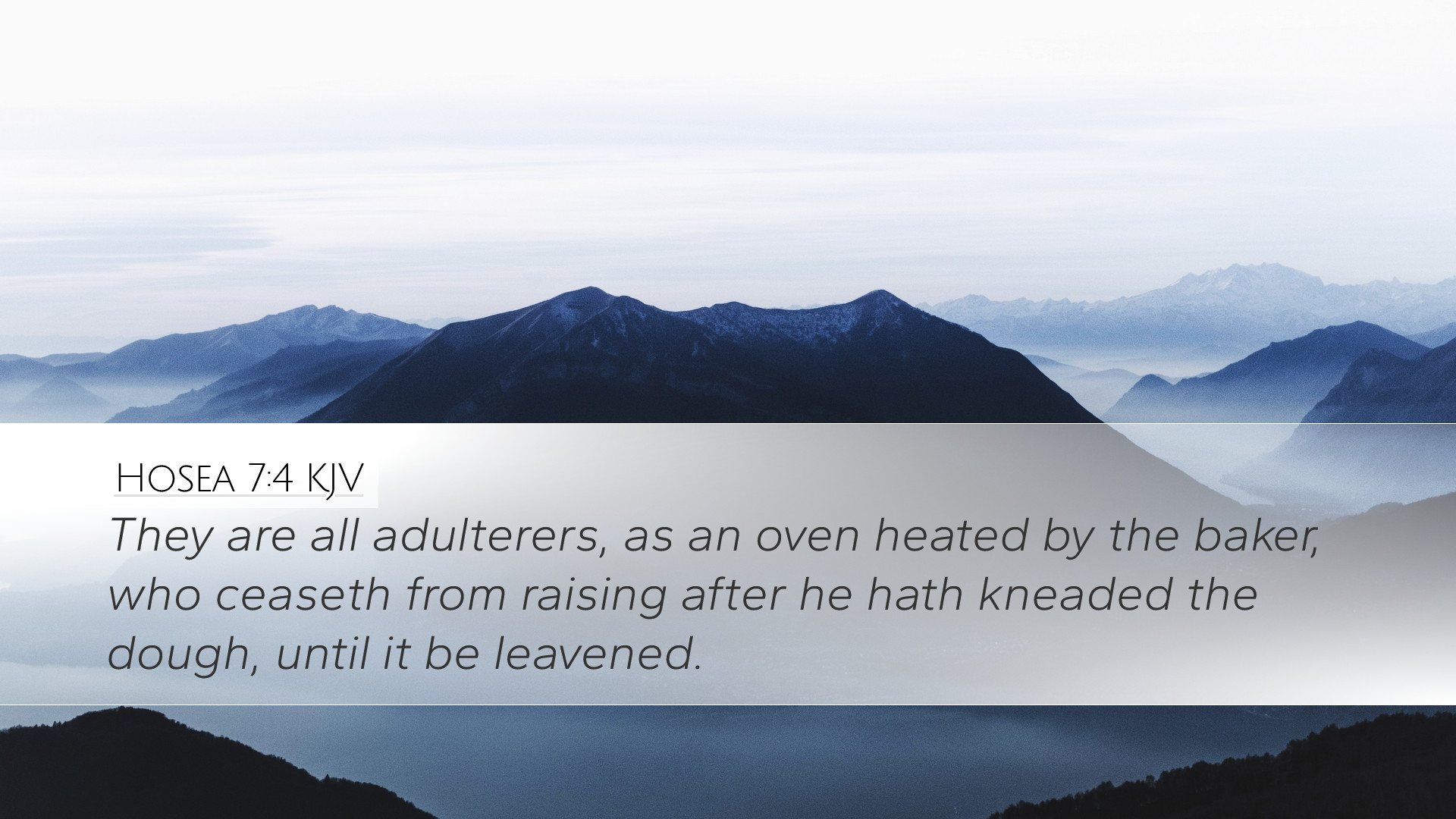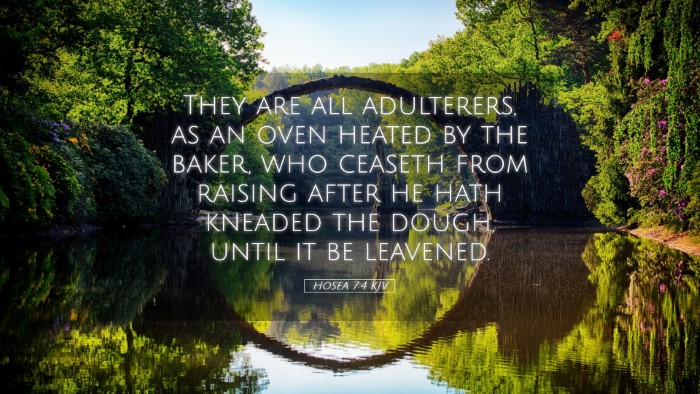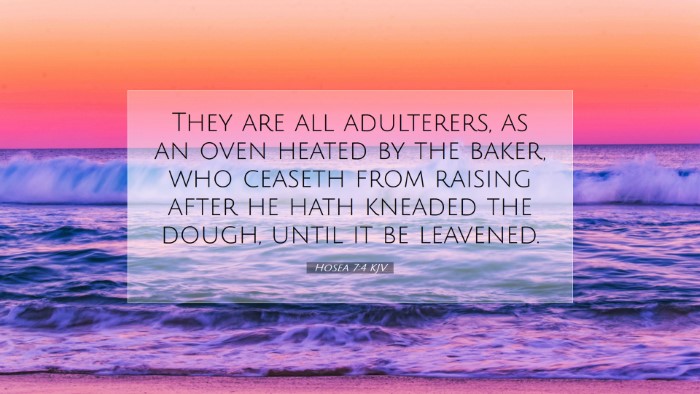Old Testament
Genesis Exodus Leviticus Numbers Deuteronomy Joshua Judges Ruth 1 Samuel 2 Samuel 1 Kings 2 Kings 1 Chronicles 2 Chronicles Ezra Nehemiah Esther Job Psalms Proverbs Ecclesiastes Song of Solomon Isaiah Jeremiah Lamentations Ezekiel Daniel Hosea Joel Amos Obadiah Jonah Micah Nahum Habakkuk Zephaniah Haggai Zechariah MalachiHosea 7:4
Hosea 7:4 KJV
They are all adulterers, as an oven heated by the baker, who ceaseth from raising after he hath kneaded the dough, until it be leavened.
Hosea 7:4 Bible Commentary
Bible Commentary on Hosea 7:4
Verse: "They are all adulterers, as an oven heated by the baker, who ceaseth from raising after he hath kneaded the dough until it be leavened." (Hosea 7:4)
Introduction
This passage from Hosea provides a profound glimpse into the spiritual condition of Israel during the time of the prophet. The image of the oven heated by the baker serves as a metaphor for Israel's unfaithfulness and the underlying issues of their sin. In the following commentary, insights from Matthew Henry, Albert Barnes, and Adam Clarke will be synthesized to aid pastors, students, theologians, and Bible scholars in understanding the depth of Hosea 7:4.
Contextual Background
The Book of Hosea addresses a period marked by social, moral, and spiritual decay in Israel. Hosea, who was commanded by God to marry a promiscuous woman, serves as a living parable reflecting the relationship between God and unfaithful Israel. The themes of adultery and unfaithfulness permeate the text, portraying Israel's forsaking of God for idolatry and wickedness.
Verse Analysis
- Spiritual Adultery:
Matthew Henry notes that the term "adulterers" indicates not only the physical acts of infidelity but symbolizes Israel's spiritual unfaithfulness towards God. Their idolatry is likened to marital unfaithfulness, where the Israelites have forsaken their covenant with Yahweh for the sake of foreign gods.
- The Metaphor of the Oven:
Albert Barnes elaborates on the metaphor of the oven, suggesting that just as an oven is heated and ready for baking, the hearts of the Israelites are heated and fervently inclined towards sin. This implies a premeditated and deliberate engagement in unfaithfulness, characteristic of their rebellious nature before God.
- Leavening of the Dough:
Adam Clarke points out the significance of 'leaven' in biblical metaphor. It symbolizes sin, and the reference to dough being prepared signifies that the process of sin is ongoing and expansive. The reference to leaven speaks to how sin corrupts thoroughly, much like how leaven works through dough, demonstrating that Israel is not merely sinning sporadically, but is under the influence of sin deeply.
Theological Implications
- God's Judgment:
The unfaithfulness of the Israelites invites the imminent judgment of God. Both Matthew Henry and Albert Barnes emphasize that God's judgment is a response to this spiritual infidelity. As the “baker” ceases to raise the dough, so too will God cease to strive with a people who have rejected Him and embraced sin.
- The Call to Repentance:
Hosea’s message serves as a reminder to God's people about the seriousness of sin and the need for genuine repentance. Adam Clarke writes that understanding these prophetic warnings is crucial for believers today, emphasizing the importance of returning to God’s covenant with sincerity rather than outward rituals.
- The Nature of Sin:
The imagery within Hosea 7:4 encapsulates how sin can become habitual and entrenched within a community. As noted by Matthew Henry, the words illustrate how the Israelites have desensitized themselves to their actions, akin to an oven that continuously burns without regard for its purpose.
Practical Applications
- Self-examination:
This verse serves as a powerful prompt for self-examination within contemporary Christian communities. Pastors and leaders are challenged to assess whether their congregations might be exhibiting similar traits of spiritual infidelity or complacency.
- Covenantal Faithfulness:
Hosea 7:4 encourages an awareness of our commitment to God. Just as Hosea called for fidelity in relationships, we are reminded to nourish our own relationship with God and avoid the distractions that lead us away from Him.
- Community Responsibility:
Spiritual health is not solely an individual endeavor but requires accountability within the community. The church is tasked with encouraging one another in faithfulness, promoting a culture that rejects the flourishment of sin, as illustrated by the metaphor of leaven in the dough.
Conclusion
Hosea 7:4 is a poignant reminder of the dangers of spiritual adultery. Through the eloquent writing of prophets like Hosea, we gain not only historical insight but also timeless truths applicable to our lives today. As we reflect on the implications of this verse, may we be motivated to uphold our covenant with God, remain vigilant against the allure of sin, and foster a spiritually vibrant community committed to God’s ways.


